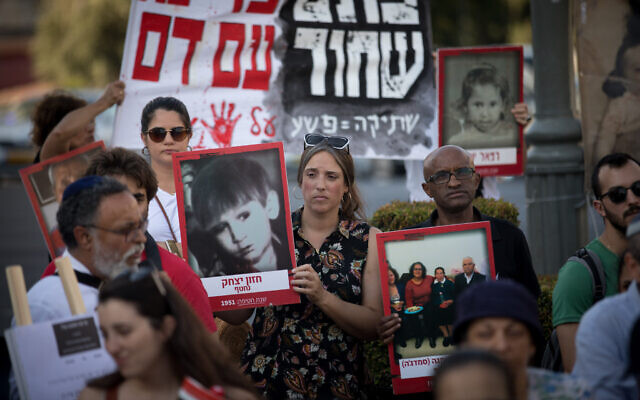The Health Ministry announced Saturday that the genetic profile of a deceased child born to Yemenite immigrants was matched to family members, confirming the baby died of disease and was not kidnapped by the state as his relatives suspected.
The remains of Yosef Melamed, who was pronounced dead in the hospital after suffering an illness nearly 75 years ago, were exhumed in July and were the first of nine bodies slated to undergo DNA testing by the Israeli National Institute of Forensic Medicine in the so-called Yemenite children affair.
Immigrants who arrived from Yemen and other Middle Eastern and North African countries have claimed for decades that their children and siblings were kidnapped from them as babies and given up for adoption in the 1940s and 1950s after they were told that the children had died.
The results of tests performed on DNA taken from the body and Melamed’s sister Ruth Sharabi demonstrated a “97.8 percent probability” that they are siblings. The test also matched DNA from Melamed’s mother Shulamit, indicating a “99.99% probability” that the body was that of her son.
Sharabi said it was “important” that doubt over Melamed’s fate had been removed, but decried the suffering her mother, 91, endured over the years.
Get The Times of Israel's Daily Edition by email and never miss our top stories
“We still haven’t cried, but today at night we will cry. Today we understand that Yossi is dead,” said Ayelet Sharabi, the boy’s niece.

Family members watch as the forensic team opens the grave of Yosef Melamed at Nahalat Yitshak Cemetery on July 27, 2022 (Avshalom Sassoni/Flash90)
Yosef was born to Shalom and Shulamit Melamed, who arrived in Israel from Yemen in 1943. Shalom fought in the Givati Brigade during the War of Independence and was killed in April 1948 while accompanying a military convoy to Jerusalem.
Shulamit, then 17, took her 1.5-year-old son to Hadassah Medical Center in Tel Aviv later that year after he fell ill. She was told the next morning by hospital staff that the baby died overnight and had been buried at the Nahalat Yitzhak cemetery, to spare her additional grief.
Shulamit believed her son to be dead until 1963, when she received an army conscription notice for him. After requesting an explanation from the Interior Ministry, she received a document stating that her son “left” the country that year.
She believed for many years her son had been kidnapped and subsequently adopted, and was still alive.
In a statement to Channel 12 news, the Health Ministry vowed to “stand with the families” and press on with their efforts to “shed light on on the fate of their loved ones and ease their pain.”
A previous attempt to produce DNA profiles from 10 other graves exhumed as part of the affair some 25 years ago, when the science was still relatively new, had failed to reach conclusive results.
Technology has made it now possible to identify complete profiles using very limited and often damaged DNA samples, which are usually typical in bodies that have been buried for a very long time.

Israelis protest as they mark a memorial and awareness day of the Yemenite Children Affair in Jerusalem on July 31, 2019. (Yonatan Sindel/Flash90/File)
Over the years, official state inquiries have dismissed all claims of mass abductions organized by medical staff or government workers. Nevertheless, suspicions have lingered and contributed to a long-standing fault line between Jews of European origin and those of Middle Eastern backgrounds.
Three high-profile investigative commissions dismissed the claims of a conspiracy and found that most children had died of diseases in immigration camps. The most recent inquiry, in 2001, said it was possible that some children were handed over for adoption by individual social workers, but not as part of a national conspiracy. However, citing privacy laws, it ordered that the testimonies it had collected remain sealed for 70 years.
In February 2021, the government approved a NIS 162 million (almost $50 million) compensation program over the issue of the Yemenite children.
The proposal included a declaration that “the government of Israel regrets the events that happened in the early days of the state and recognizes the suffering of families whose children were part of this painful issue.”
However, a number of families involved demanded that the government reveal confidential documents relating to the matter, calling the compensation plan “hush money.”


